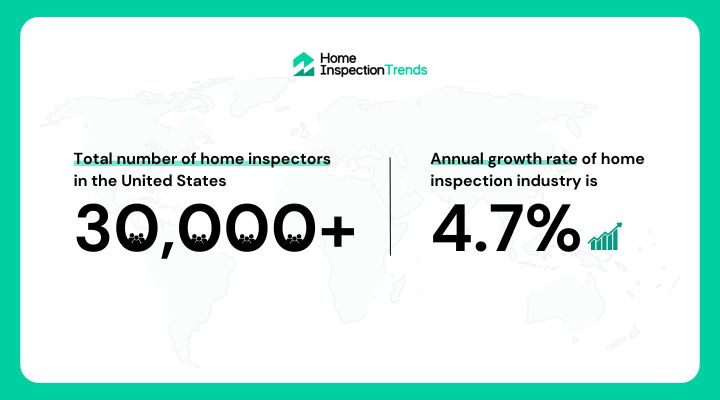Home inspectors play an important role in helping people in making informed decisions when buying or selling a home. These experts examine homes thoroughly, assessing various systems, structures, and components to provide a comprehensive assessment of the condition of the home.

The home inspection industry has witnessed significant growth in recent years with a steady compound annual growth rate (CAGR) of 4.7%. According to the American Society of Home Inspectors, there are over 30,000 home inspectors in the United States, which shows the industry’s growth and relevance. It’s growth is also driven by the growing awareness among buyers and sellers about the value of thorough inspections.
Starting a career as a home inspector can be an excellent financial and professional decision. In fact, some of the highest-paid home inspectors in the U.S. earn a good living. While individual earnings vary depending upon factors like location, experience, and client base, the highest-earning inspectors can earn six-figure annual salaries.
Now, let’s understand why home inspection is a good career, discussing the need for home inspectors, the job’s desirability, and its potential as a side hustle.
Why Home Inspection is a Good Career

The Need for Home Inspectors
According to a survey from ASHI, more than 70% of homeowners agree their home inspection helped them avoid potential problems, which shows the increasing demand and value of home inspectors.
Home inspectors play a vital role in facilitating transparent real estate transactions, helping buyers make informed investments and sellers address property issues, and making a positive impact on clients’ lives.
Is this a fulfilling job?
A career in home inspection goes beyond the financial benefits. It provides the satisfaction of assisting people in resolving real-world problems. As a home inspector, you help buyers and sellers make informed decisions by providing comprehensive reports and recommendations on their property’s condition. This way. you contribute to your client’s well-being and peace of mind by doing so.
In fact, 68% of home inspectors reported that their work-life balance was just about right, according to IAEI Magazine.
Understanding its potential as a side hustle
For those looking to diversify their income streams, becoming a home inspector is an excellent side hustle. Many aspiring inspectors begin working part-time while also managing other responsibilities, gradually building their reputation and client base.
The flexible nature of the job also allows you to choose when and how much you want to work, which gives you the ability to balance your home inspection career with other professional or personal work.
Home Inspector Salary

When considering a career, it is important to analyze its earning potential. A home inspection provides varying income levels depending on a variety of factors such as location, experience, specialization, and market demand.
Income Range of Home Inspectors
The average Home Inspector’s salary in the United States is $49,132 and $61,690, according to Salary.com. This figure represents the midpoint, which means that half of the inspectors earn more than this amount.
The lowest 10% of inspectors earned around $35,000 annually, while the highest 10% made approximately $150,000 or more.
Income by Monthly, Per House, and Per Inspection
The exact income of a home inspector on a monthly, per-house, or per-inspection basis is determined by a number of factors. A full-time home inspector usually conducts 15 to 20 inspections per month. With an average fee of $300 to $500 per inspection, this translates to a monthly income range of $4,500 to $12,500.
However, depending on your location, the size and complexity of the properties, and the current market conditions, the number of inspections performed and the fees charged can vary significantly.
Pros and Cons of Being a Home Inspector
To make an informed decision about pursuing this profession, it is essential to weigh these factors carefully. Let’s take a closer look at the pros and cons of working as a home inspector.
Pros
- Flexibility in work schedule and location.
- Opportunities for entrepreneurship and self-employment.
- Varied and interesting work environments.
- Continuous learning and personal development.
- Potential for high earning potential, especially for experienced inspectors.
- The satisfaction of helping clients make informed decisions.
- Possibility of working part-time or as a side hustle.
- No need for a college degree, although education and training are essential.
- Growing industry with a consistent demand for home inspections.
- Entry-level barriers are relatively low, making it accessible to new professionals.
Cons
- Physically demanding work, involving climbing, crawling, and navigating confined spaces.
- Irregular income, especially for those starting out.
- Dealing with potential conflicts or dissatisfaction from clients.
- Staying on toes and maintaining up-to-date knowledge and skills in this competitive market.
- Occasional exposure to hazardous substances, such as mold or asbestos.
- The need to handle paperwork and administrative tasks related to running a business.
- Occasional work on weekends or evenings to accommodate clients.
- The pressure to identify hidden defects and accurately assess a property’s condition.
- Potential liability if an inspector misses a significant issue during an inspection.
- The need for marketing and self-promotion to establish a client base.
A Step-by-Step Guide to Becoming a Successful Home Inspector
According to Working RE Magazine, 15% of home inspectors fail due to a lack of technical skills to perform quality inspections or an inability to establish a successful business. To succeed in this industry, it is important to have a well-defined strategy in place.
This step-by-step guide aims to outline the essential stages and considerations involved in becoming a home inspector, providing you with a solid foundation to thrive in this profession.
1. Research and Understand the Requirements
Start by researching the requirements specific to your locality or jurisdiction. Understand the educational, training, and licensing requirements necessary to become a certified home inspector in your area.
2. Enroll in a Quality Home Inspection Program
Choose a reputable and comprehensive home inspection program from reputable organizations such as InterNACHI and American Home Inspectors Training (AHIT) that covers all aspects of being a home inspector. Look for programs that provide hands-on training, field experience, and comprehensive instruction on building systems, codes, and report writing.
3. Gain Practical Experience
Practical experience can help to supplement your education. Seek opportunities by shadowing and assisting experienced home inspectors, taking part in mock inspections, or assisting in actual assessments while under supervision. This practical experience will boost your knowledge and confidence.
4. Obtain Certifications and Licenses
Complete the necessary certifications and licensing requirements mandated by your jurisdiction. This may involve passing examinations, fulfilling education requirements, and demonstrating proficiency in specific areas.
5. Develop a Professional Network
According to InterNACHI, 72% of home inspectors receive referrals from realtors. This highlights the significant impact realtors have on the home inspection business, emphasizing their value as a valuable source of referrals. To maximize your opportunities, it is crucial to actively network with real estate agents, brokers, contractors, and other professionals in the industry to foster meaningful relationships.
Attending industry events, joining professional associations, and engaging with the real estate community are effective strategies to build relationships and get referrals.
6. Invest in Professional Tools and Equipment
Equip yourself with the necessary and modern tools and equipment to perform comprehensive and quality home inspections. This includes items such as radon test kits, moisture meters, electrical testers, thermal imaging cameras, and other specialized tools relevant to your area of expertise.
7. Establish Your Brand and Marketing Strategy
Create a professional brand identity, including a logo, website, and marketing materials. Develop a marketing strategy that targets potential clients and highlights your unique selling points.
8. Get an Insurance Coverage
Protect yourself from potential liability issues by getting professional liability insurance. Consult an insurance provider who specializes in home inspection coverage to determine the best coverage for your company.
9. Provide Exceptional Customer Service
Focus on delivering exceptional customer service throughout the inspection process. It is important to note that clients appreciate clear communication, timely reporting, thorough inspections, an empathetic nature, helpful recommendations, and a professional demeanour. We recommend that every smart home inspector prioritize these factors, as they are crucial for building a strong reputation, fostering repeat business, and generating referrals.
10. Continuously Learn and Evolve
Stay updated on industry changes, building codes, and emerging technologies. Here are some best ways to stay ahead of the curve:
- Participate in continuing education programs
- Attend conferences and workshops
- Read industry publications
- Get feedback from clients
- Stay curious and be open to learning new things
- Invest in professional development to enhance your knowledge and skills
Conclusion
A career in home inspection has many advantages and opportunities. The industry’s growth, consistent demand for inspections, and the possibility of a high income make it an appealing choice for those looking for a rewarding and financially viable career. You can build a successful and thriving home inspection career by investing in education, gaining practical experience, and constantly evolving your skills.
Frequently Asked Questions
How good is a home inspection business?
A home inspection business can be highly rewarding if you are dedicated, provide thorough and accurate inspections, and establish a strong reputation within the real estate community. However, success can also depend on external factors such as market demand, competition, and your ability to deliver exceptional customer service.
Is becoming a home inspector worth it?
Yes, becoming a home inspector can be both personally and financially rewarding. It allows you to work independently, assist clients in making informed decisions, and contribute to the real estate industry. In addition, with the potential for a high income, career flexibility, and the ability to work as an entrepreneur, becoming a home inspector is an option worth considering for those looking for a fulfilling and financially viable career.
Is it hard to become a home inspector?
To become a home inspector, you must be dedicated, committed, and willing to invest time and effort in education and training. While it may not be as difficult as pursuing a traditional college degree, it does require knowledge of building systems, codes, and regulations, as well as the ability to conduct thorough inspections. But with the proper education, training, and practical experience, it is a goal that those who are passionate about the profession can achieve.
Where do home inspectors get paid the most?
Home inspectors are typically paid the most in areas with high housing costs and active real estate markets, such as metropolitan cities or regions where inspections are in high demand. The top 5 states with the highest average annual salaries for home inspectors in 2023 are California, Hawaii, New York, Massachusetts, and Colorado.
What qualifications or certifications should a home inspector have?
Home inspectors should have qualifications such as completing a comprehensive home inspection training program and obtaining relevant certifications, such as those offered by organizations like ASHI (American Society of Home Inspectors) or InterNACHI (International Association of Certified Home Inspectors).
Are home inspections required by law, or are they optional?
Home inspections are not usually required by law, but they are highly recommended and frequently requested by buyers and lenders during real estate transactions. While inspections are optional, they provide important insights into a property’s condition, allowing buyers to make informed decisions and negotiate repairs or adjustments if necessary.




